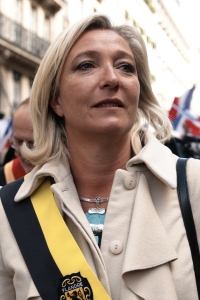Whose Union?
The results of the European parliamentary elections held on May 25th resounded in France with a bang, as Marine Le Pen’s National Front achieved its most substantial political victory in years. Gaining a quarter of the vote, the far-right party secured 24 of the country’s 74 seats in Strasbourg. On May 26th, words like “Carnage,” “Earthquake,” and “The Big Bang” flooded the French press’ vocabulary while commentators and politicians alike decried the downfall of the republic. Despite the event’s significance, the growth of Europhobic sentiment responsible for Le Pen’s success can be largely attributed to the actions of France’s establishment parties.
The unprecedented nature of the event can be explained by understanding the role the National Front has traditionally occupied in the French political sphere. The Front National is a conservative, economically protectionist political formation characterized by a strong nationalist and anti-immigration sentiment. Derided as a fringe group, the party gained political relevance in 2002, when founder and then-leader Jean-Marie Le Pen unexpectedly came in second in the presidential election. In spite of the high voter abstention rate, “le 21 avril” spurred much of the same shock that was experienced this past May and left its mark on France’s political conscience.
Notorious for making offhanded, xenophobic comments and for his public spurts of fury, Jean-Marie effectively kept the party from gaining the support of the common voter. However, since Le Pen’s daughter, Marine, succeeded him as party president in 2011, the Front has undergone a process of “dédiabolisation” (or de-demonization) which has sought to shake off its infamous reputation and enter the world of mainstream politics. The outcome of this year’s European elections has thus proved the success of this initiative, and also presents a rather worrisome reality to those who perceive the looming triumph of nationalism over democratic values in France.
The French election results reflect a larger continental trend of distrust of technocratic Brussels, commonly referred as to as “Euroscepticism”. Le Pen capitalized on this feeling and has collected the votes to show it. A survey conducted two weeks prior to the election by French polling agency CSA showed that only 20% of French electorate expressed confidence at the thought of continued political growth of the European Union versus 48% who were worried about it. By contrast, the entirety of the mainstream French political establishment campaigned on a pro-European platform, offering very limited appeal to quell Eurosceptic concerns. The National Front, however, is opposed to the very existence of the EU. Le Pen put much effort into a campaign to convince voters of its threat to French interests and of the benefits of its termination (with particular emphasis on the burden of the euro to France’s economy).
The foremost expression of Euroscepticism, however, is indifference. French voters, like their counterparts in other EU member-states, have increasingly shown little interest in European elections. Although 2014 was the first year that saw a decline in voter abstention rates for European Parliament, at 56% it still remains considerably higher than what it is in most national elections (around 20% of voters abstained from the 2012 French presidential election).
However, when they do cast their ballots, voters typically do so less out of concern for the future of European politics, but rather to send a message to the sitting government. Such was the case of the 2005 referendum on the adoption of a European constitution, in which a resounding ‘No’ vote was largely cast to express discontent about the national economic and social situation and prompted then-president Jacques Chirac to reshuffle his government. In fact, another survey conducted by CSA following the May 2014 election showed that even amongst Le Pen’s partisans, 69% of those who voted did so to express disapproval of president Hollande.
If French voters feel increasingly detached from Brussels, it is in large part thanks to the ruling political class. Although the political establishment has always held a pro-EU stance, European parliamentary campaigns have received minimal effort and platforms have been invariably vague and given little account for work accomplished by incumbent MEPs. In parallel, the French media also allocates far less coverage to the European elections than to other national ballots. It is to be expected then that French people have scant understanding of European institutions and their impact on daily life. Perceived by the French as a well-guarded secret, the actions of the European Commission, and therefore its implications on the European Union, will perhaps never attract their attention unless it affects them directly. Since France and the Eurozone were hit by the 2008 financial crisis, the establishment has however made it a habit of using Brussels as a scapegoat for its own shortcomings, but then it also takes credit for the former’s accomplishments. It is unsurprising then that a sustained pro-EU stance appeared as questionable and contradictory to voters.
French politicians of the right and left may be correct in fearing Le Pen’s ascension, but the Eurosceptic wave that she rode to victory was ultimately a product of their own creation. Until the French political class can successfully make the famed “projet européen” more relatable to French voters, the latter will continue to care more about their national conscience over the tale of a shared European identity.

